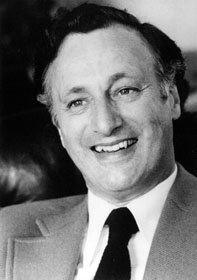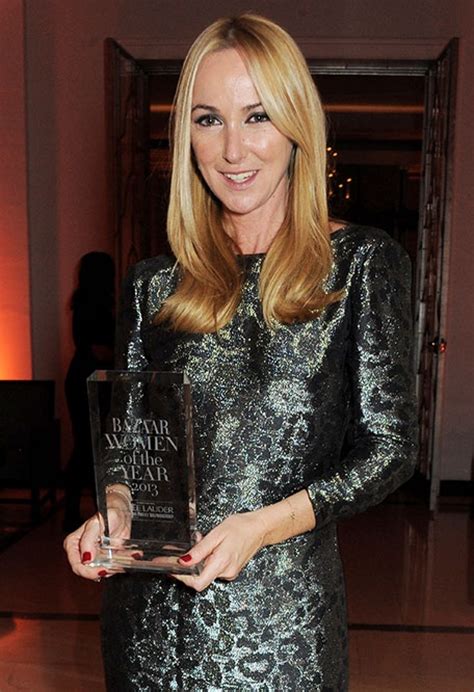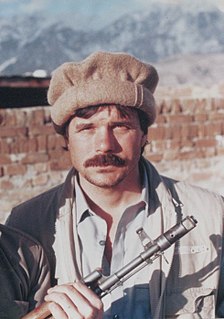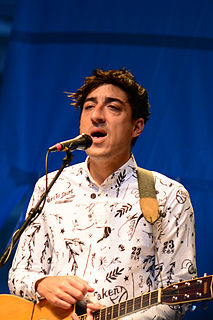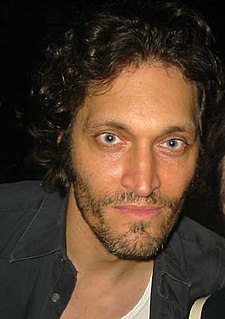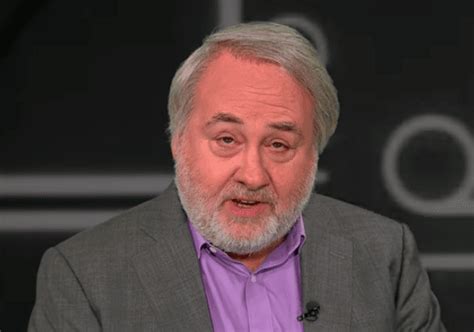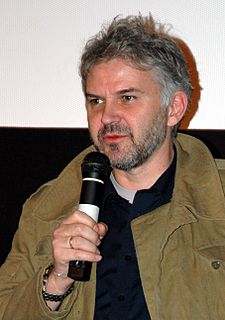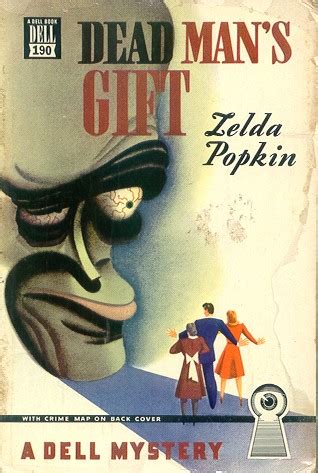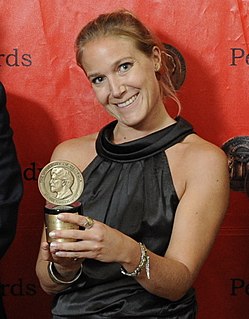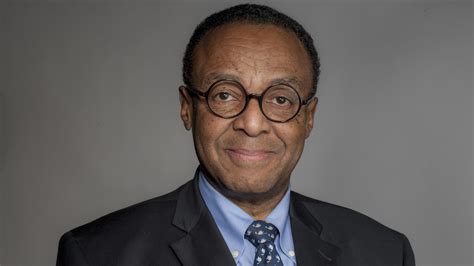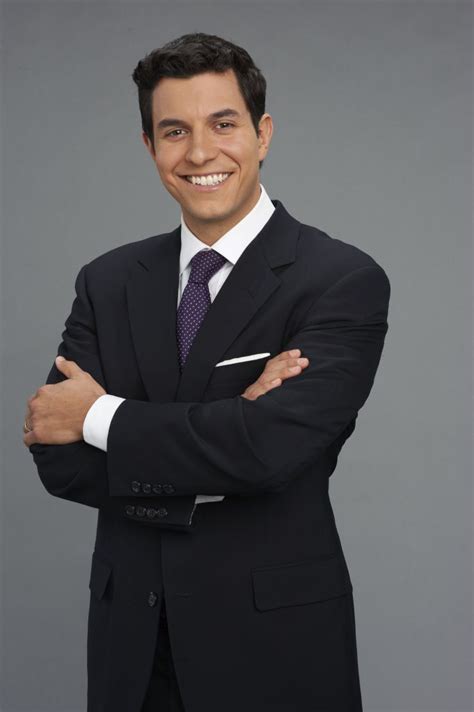Top 1129 Journalist Quotes & Sayings - Page 19
Explore popular Journalist quotes.
Last updated on April 19, 2025.
The most recent example and the most, I think, appalling example was when Martin Peretz, the owner - and I stress owner - of The New Republic fired a journalist who I think was uncommonly skilled and full of integrity and passion and all that stuff. But he had criticized regularly the former pupil and friend of Martin Peretz, Al Gore, so he was fired. That's contrarianist that went around - that did - that was not rewarded.
The American journalist Barbara Ehrenreich has written about this in her book Smile or Die: How Positive Thinking Fooled America and the World (2009) . She talks about the happiness industry, the rise of medication to make us happy and of self-help books, and the influence of all this on religion. In many ways religion has become another form of self-help. We all suffer from over-exposure to positive thinking.
One of the things that always drives any practitioner of journalism crazy is you'll run it people who say why doesn't the media cover this or that? Well of course the media covered it. Why didn't you read about it? And, you know, it's, you know, there you are, it's not the journalist's job to knock down your door, you know, punch the URL into your computer and force you to stop watching the Kardashians and to read, you know, a report on integrity in government instead, it's your job.
I had an interview once with some German journalist - some horrible, ugly woman. It was in the early days after the communists - maybe a week after - and she wore a yellow sweater that was kind of see-through. She had huge tits and a huge black bra, and she said to me, "It's impolite; remove your glasses." I said, "Do I ask you to remove your bra?"
I read reviews every time. I read them all. Sometimes they can be very constructive, sometimes not, but it's always interesting to see the opinion of others on what you are doing. Sometimes I am very furious, but I will never say to a journalist, "Please don't come back to the next show." Never. Because I think that's a very stupid attitude. I am very happy when I see the results of the company and when I see people wearing my clothes or my accessories. I think this is the best answer to criticism.
I was charging forward too hard, into too many war zones, working too long, drinking too heavily, pushing forward, pushing forward. And who knows, had this not happened, maybe I would have been one of the casualties as a journalist covering the war. Who knows, maybe I would have been captured and tortured somewhere along the line, because I always pushed things to the limit.
John Dorschner, one of our staff writers here at Tropic magazine at The Miami Herald, who is a good friend of mine and an excellent journalist, but a raving liberal, wrote a story about a group that periodically pops up saying that they're going to start their own country or start their own planet or go back to their original planet, or whatever. They were going to "create a libertarian society" on a floating platform in the Caribbean somewhere. I know there's never going to be a country on a floating anything, but if they want to talk about it, that's great.
he ones that bother me the most are the media saying, "He's like the next Bill Hicks." It's supposed to be complimentary, but then all these Bill Hicks fans show up thinking you're going to be like him, and then go, "You're no Bill Hicks." And I'm like, "I never wanted to try to be like him, I don't think I'm anything like him at all, and now you're mad at me for not being him because a journalist didn't have a better reference."
As a journalist, I never critiqued anyone. I never review books. I've never felt qualified as a musician to say whether someone is a good musician or a bad musician. What happens with Black writers and Black artists is that if you're critiqued, for example, by a Black historian who wants to get his name on the cover of "The New York Times," and he says something, like, wacky, well, he'll get his name on the cover of "The New York Times" and he might get tenure, and your career suffers.
Your regional newspaper, and I like to use this example, in your local museum buys a Picasso, that's news especially if they've spent $10 million for it. But if you don't have a credit on your staff then you don't have anybody who's confident to say whether or not it was a good Picasso, might even be aware of the fact that there are bad Picassos. Arts journalists who don't have the experience of criticism, the skill of criticism, don't think in terms of critical evaluation are not going to be as good a journalist as they might be.
I feel like there's not as many bands anymore. It's more like there's a front-person and a band supporting them, solo-type spirits that have a look, a vibe, a message, a voice and a style. I was talking about it with a journalist in Europe; he was like, "You're a democracy; everyone in the band does stuff." There's not a lot of bands I can think of that still have it so every member of the band has an equal say. I was like, dude, you're right. I can't really think of any right now. There might be one or two leaders in them, but there are not a lot of bands like that anymore.
I have a general feeling that writers and artists who are in this peculiar situation, of being a persecuted artist, all anyone ever asks about is the persecution. It may well be that's the last thing in the world they want to talk about. There were many years in which every journalist in the world wanted to talk to me, but nobody wanted to talk to me about my work. That felt deeply frustrating because I felt there was an attempt to stifle me as an artist. The best revenge I could have was to write.
A lot of college graduates approach me about becoming screenwriters. I tell them, 'Do not become a screenwriter, become a journalist,' because journalists go into worlds that are not their own. Kids who go to Hollywood write coming-of-age stories for their first scripts, about what happened to them when they were sixteen. Then they write the summer camp script. At the age of twenty-three they haven't produced anything, and that's the end of the career.
Doing interviews is very different from working as an actor, because it's up to the journalist not only to understand what I'm trying to convey, but to convey that understanding through their process. And often times it gets manipulated, sometimes intentionally, by pulling things out of context. Some people may not appreciate your work and some may be incredibly moved by it. So that isn't the concern. You have to do what you can do, and share what you feel is appropriate to share in the moment. And then, it's out of your control.
I'm talking to a journalist and I really have nothing to say anymore, this is already uncomfortable. I feel the pain coming already. The brutal pain, when one day I should read your edit of whatever I say, because no matter what I say, no matter how I say it, no matter its tone, its frequency range, its decibel level or the way in which I put the words together, no matter my intentions and no matter the truth. What I'll read one day will be a chastised, manipulated abortion of your misunderstandings, your manipulations, your agenda and your amateur use of the English language.
I never intended to have a career as a journalist, writing about people who make movies. I did it as something that was really rewarding to do, given the opportunity to express myself about something I cared about, and also to learn a lot by watching filmmakers I admired. In a sense, it was my film school. After doing it for a few years, I decided that the time had come to get it together and do some work of my own. Even for a cheap movie, you need film stock and equipment and actors. Whereas to write, all you need is paper and an idea, so I felt that writing might be my stepping stone.
It's no mystery why many of us in the media can't get enough of the fabricators Jayson Blair and Stephen Glass, the latter of whom concocted more than a score of bogus feature stories for the New Republic (and who wrote for other magazines, including this one, once) in the mid-1990s. Anyone--journalist, student, academic--who has ever stared at a blank screen, their brains grinding emptiness, and thought, How can I fill this hole? knows that in those desperate moments before a deadline, almost anyone can do almost anything: make stuff up, plagiarize, scribble senseless half-truths.
If you look at the Associated Press wires, there's a constant flow of information coming in. At that time I happened to have direct access to AP wires. The day the marines landed in Haiti and restored [ Jan Bètran] Aristide there was a lot of excitement about the dedication to democracy and so on. But the day before the marines landed, when every journalist was looking at Haiti because it was assumed that something big was happening, the AP wires reported that then [Bill] Clinton administration had authorized Texaco to ship oil illegally to the military junta.
We have a game we play when we’re waiting for tables in restaurants, where you have to write the five things that describe yourself on a piece of paper. When I was [in my twenties], I would have put: ambitious, Wellesley graduate, daughter, Democrat, single. Ten years later not one of those five things turned up on my list. I was: journalist, feminist, New Yorker, divorced, funny. Today not one of those five things turns up in my list: writer, director, mother, sister, happy.
The first job of the historian and of the journalist is to find facts. Not the only job, perhaps not the most important, but the first. Facts are the cobblestones from which we build roads of analysis, mosaic tiles that we fit together to compose pictures of past and present. There will be disagreement about where the road leads and what reality or truth is revealed by the mosaic picture. The facts themselves must be checked against all the available evidence. But some are round and hard--and the most powerful leaders in the world can trip over them. So can writers, dissidents and saints.
Because I would never work for a niche publication or a niche program on television and because I am a journalist and not an opinion person, my job is to try to see how many different points of view I can represent or how. It's not even a question of who you don't offend because you are always going to offend somebody. The question is how can you get people to listen to the information you have to present.
I had to first convince them [prostitutes] that I wasn't a journalist who would yet again put out a notion about them they wouldn't necessarily care for or who would victimize them. You know, journalists come and go. If they come twice, it's a lot. But I come 10 times and hang out with them and share stuff. If you connect with someone just once, that's something. But if you can connect twice, that's something else.
Every day, there'd be somebody interviewing me as a "lesbian living in Russia." It got to the point where I would joke that I now have two jobs. I work as a writer and a journalist, and I also work as a lesbian. There's a big difference between being out and having that be your sole identity, the only reason that someone is talking to you. My twelve-year-old daughter said, "I have a new job as well. I work as the daughter of a lesbian," because she was also giving all these interviews.
National security is a really big problem for journalists, because no journalist worth his salt wants to endanger the national security, but the law talks about anyone who endangers the security of the United States is going to go to jail. So, here you are, especially in the Pentagon. Some guy tells you something. He says that's a national security matter. Well, you're supposed to tremble and get scared and it never, almost never means the security of the national government. More likely to mean the security or the personal happiness of the guy who is telling you something.
The Washington press corps thinks that Julie Nixon Eisenhower is the only member of the Nixon Administration who has any credibility--and, as one journalist put it, this is not to say that anyone believes what she is saying but simply that people believe she believes what she is sayingit is almost as if she is the only woman in America over the age of twenty who still thinks her father is exactly what she thought he was when she was six.
To a lot of people, my job is really fancy, so they're like, "Oh, whoah, you're a musician, wow!" Some people go to you, "Oh my god, you're a journalist!" And some people go, "What, you're a therapist? That's incredible!" So everyone, to a certain extent, has other people that you get impressed by, without even having a proper conversation or getting to know them. You're just like, "Oohhh, they're a bit fancy!"
I can tell when I've met a bad journalist when they say, "I've met Madonna," or "I know Marilyn Manson." Because I haven't met anyone I've ever interviewed. I've sat down in the position of an interviewer, and they've sat down in the position of an artist trying to promote a product. We have no relationship. I'm able to ask them questions I'd never be allowed to ask them if we were casual friends. It's a completely constructed kind of situation.
You do not conceive a novel as easily as you conceive a child, nor even half as easily as you create nonfiction work. A journalist amasses facts, anecdotes and interviews with top brass. Enough of these add up to a book. A novelist demands quite different things. He has to find himself in his materials, to know for sure how he would feel and act and the events he writes about. In addition, he requires a catalyst — a person, idea, or emotion which coalesces his ingredients and makes them jell into a solid purpose.
...the prominent Egyptian government minister, university professor, and writer Taha Hussein...devoted himself to the study of pre-Islamic Arabian poetry and ended up concluding that much of that body of work had been fabricated well after the establishment of Islam in order to lend outside support to Koranic mythology.... [T]he Iranian journalist and diplomat Ali Dashti...repeatedly took his fellow Muslims to task for not questioning the traditional accounts of Muhammad's life, much of which he called myth-making and miracle-mongering.
One journalist said that everybody in Russia is miserable. Russia is a terrible place. And I'm going to end up miserable and I'm going to be a drunk and I'm never going to do anything. I don't drink. I've never been drunk in my life. And they talk about Russia like it's the worst place on earth. Russia's great.
I think the desire to be a journalist started post-911. I'm Syrian American. I speak fluent Arabic. I'd come back to the States for college. I went to Skidmore in upstate New York. I was coming from Turkey, and I'd noticed that I could talk about concepts and ideas and people who seemed foreign to Americans, and they were interested in what I had to say. I think some of it is maybe because I'm very unassuming and I look American, but I'm very much from there as well so I can speak with authority about all of these issues.
There is only one way of surviving all the early heartbreaks in this business. You must have a sense of humor. And I think it also helps if you are a dreamer. I had my dreams all right. And that is something no one can ever take away. They cost nothing, and they can be as real as you like to make them. You own your dreams and they are priceless. I've been a lavatory attendant, a theatre usher, a panhandler, all for real. Now, as an actor, I can be a journalist today and a brain surgeon tomorrow. That's the stuff my dreams are made of.
I will say that the difference was that when you're an Army journalist, as opposed to a civilian correspondent covering the military, you're very often either a public relations agent or expected to perform that role. I would say that one of the most unexpected benefits of that job was being taught to never try to cover anything up, but rather to get any bad information out right away, so that there would be nothing more to come out later. This was a wonderful lesson to be taught because often the effort to cover up a story becomes a bigger story than the original one.
This is a tradition of resistance to the term that's as old as the term itself, especially because that term has been used to commodify and reduce black creativity, and also to appropriate and sell it. That's what John Coltrane said in an interview with a Japanese journalist: "Jazz is a word they use to sell our music, but to me that word does not exist." And he's treated as one of the central figures in the history of jazz. So if he rejected it, then why is it weird when I do it? I'm in the tradition!
My job is to cover the hell out of the story, very aggressively. The real place to be courageous if you're a news organization is where you put your people to cover the story. It's making sure that you have people going to Baghdad. It's making sure that you figure out how to cover the war in Afghanistan. While the journalist in me completely stands with them, the editor of the New York Times in me thinks my job is to figure out what the hell happened and cover the hell out of it, and that's more important than some symbolic drawing on the front page.
I like Twitter more than Facebook. Twitter is a great way to deliver and get news. In news writing less is more and 140 characters is great. If you can't grab that headline in 140 characters than it's not a story. Viewers tweet all the time and they tell what stories they like and don't like. It's great to interact with them and get that instant feedback. It's great for the viewer and the journalist.
I was never a critic. I was a journalist and wrote about filmmakers, but I didn't review movies per se. I make that distinction only because I came to it strictly as someone who was just a lover of storytellers and cinematic storytellers. And I still am. I'm still a great movie fan, and I ,that love of movies is very much alive in me. I approach the movies I make as a movie-lover as much as a movie-maker.
For some people, I got away with something. And you know what? That's a fair thing to say, for them. I'm not saying I agree with that, but I can see how they can say that. But it's a matter of just like...you know, I'm really fortunate. As a journalist, I don't have to agree with you to talk to you. My job is to figure out why you think the way you think. I want to get to the root of why you think the way you think. That's what I find most fascinating as a storyteller.
Being a journalist, I never feel bad talking to journalism students because it’s a grand, grand caper. You get to leave, go talk to strangers, ask them anything, come back, type up their stories, edit the tape. That’s not gonna retire your loans as quickly as it should, and it’s not going to turn you into a person who’s worried about what kind of car they should buy, but that’s kind of as it should be. I mean, it beats working.
The man is a humbug — a vulgar, shallow, self-satisfied mind, absolutely inaccessible to the complexities and delicacies of the real world. He has the journalist's air of being a specialist in everything, of taking in all points of view and being always on the side of the angels: he merely annoys a reader who has the least experience of knowing things, of what knowing is like. There is not two pence worth of real thought or real nobility in him. But he isn't dull.
A $200 million contract just got awarded to develop software to provide the Department of Defense with all these sock puppets who have fake Twitter and Facebook accounts. Why not create ten fake Libyan Twitter users and then get one journalist to follow them. But the problem is, of course, it corrupts the entire process. One of the caveats is that anything they write is going to be in a foreign language so it won't affect Americans. But that doesn't make any sense because: A) it can be translated pretty easily, and B) Americans also speak other languages.
Like a versatile baller, George Dohrmann swings seamlessly from position to position: investigative journalist, social critic, gifted storyteller. The result is a gem of a book that addresses THE question central to contemporary basketball: how does such an unseemly culture spring from such an essentially beautiful game? You'll come away rooting harder than ever for the kids and harder than ever against the basketball profiteers.
I was spurred by the fact that having worked for women's magazines myself as a journalist, if you go off and interview a female celebrity, I'd just go in and interview them like I'd interview any human being and talk about the things that interested me. And you'd come back, and you'd file your copy. And then my editor would read through my copy and go, why haven't you asked them if they want kids? And I'd be like, well, I don't know, I interviewed Aerosmith last week. And I didn't ask them that.
We drank quite a lot and Tony Harrington said, "We're thinking of starting a record label at The Wire; how about you do a solo record?" I said, "Well, how am I going to do that?" I thought about it, and I'd been working on a lot of music in the years before, and I was working as a journalist, full time, really, up until that point; in whatever little spare time I had, I was working on music. So I said yes.
I try to come to my reporting as a real, whole person, not an automaton. And it's always one of the strange discomforts of the job, that you're in this very intense moment in someone's life - you're engaging with them nonstop - and then suddenly your piece is out and that's done. It always reminds me that the journalist's job isn't to be someone's friend, or their psychologist, or anything other than what we actually are. And at the end of the day, that can definitely seem like such a strange, extractive relationship.
Last year, the journalist Malcolm Gladwell conducted a survey of chief executive officers of Fortune 500 companies for his book Blink. He discovered that while in the US population 14.5 per cent of all men are 6ft (1.83m) or taller, among CEOs of Fortune 500 companies the proportion is 58 per cent. And while 3.9 per cent of American adults are 6ft 2in or taller, almost a third of the CEOs were that tall.
